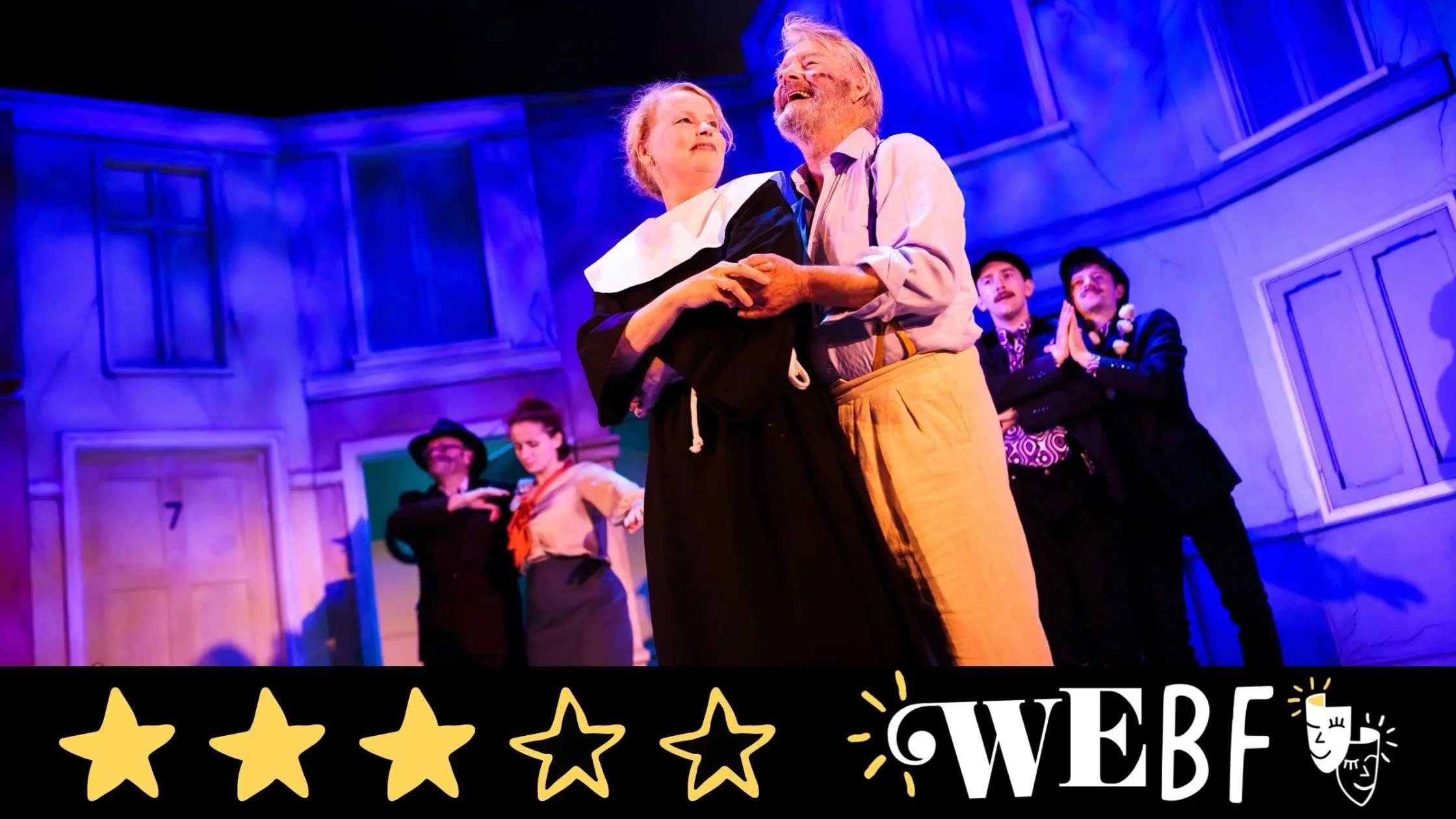Review: THE COMEDY OF ERRORS, Yvonne Arnaud Theatre
Photo credit: Harry Elletson
The trouble with seeing one of a pair of linked plays, happening at the same time, is that you can’t help wondering if the other audience might be having a better time. And that does seem to be what happened to us at The Comedy of Errors. There was clearly a great deal happening offstage - but we would have to see A Company of Rascals to find out any more about that.
Both plays began together, outside the Yvonne Arnaud Theatre in the park next to the River Wey navigation. As in the plot, some of the characters arrived by boat, with the park standing in as the docks at Ephesus. Audience members had bought tickets for one play or the other, but all saw this opening together, in which the gold necklace, which would feature heavily in the plot, was first shown to us.
Both audiences then followed the cast into the main theatre, where The Comedy of Errors audience sat in the front stalls. Those who had tickets for Phil Porter’s A Company of Rascals sat at the rear as they would be leaving shortly for other locations, only rejoining the theatre audience for the final scene. Both plays feature the same characters, with Phil Porter showing his audience what is happening when someone went offstage in Shakespeare’s play. The departure of the outdoor audience is not seamless however, with the theatre audience left looking at an empty stage with the sound of a bell tolling – all a bit of a downer.
The audience experience for The Comedy of Errors is largely a conventional one, apart from the opening scene in the park. A lively, if occasionally over-manic, production big on colour and music, it’s always watchable although sometimes directorial choices bemused. A big plus of Joanna Reid’s production is the design by Neil Irish, particularly of the costumes. A key point of this play is that both sets of twins should be mistaken for each other. So often they are anything but identical, but clever costume design here ensures that we believe in all the confusion.
This is an innovation for Guildford Shakespeare Company and the Yvonne Arnaud, working together on a production for the first time. An ambitious approach and to be applauded, although the production of The Comedy of Errors in the main theatre does not perhaps benefit from this as much as the sister production elsewhere. Leading cast members like Robert Duncan and Sara Crowe play only small parts at the beginning and end of the Shakespeare play, with Matt Pinches, co-founder of GSC and the best thing about recent YA Guildford panto's, playing only a cameo.
There are competent actors to be seen in the play, with the central quartet well cast. Jeremy Lloyd contrasts nicely with his more dishevelled brother, and Peter Losasso and Mark Milligan, in particular, are a pair of nimble and energetic servants. Unfortunately, every time we begin following the plot, everything comes to a halt for another lengthy burst of recorded 1960s music and much frantic dancing, with occasional set changes also seeming to slow everything down. Occasionally, inaudible dialogue is shouted over the music, for example when Angelo is looking for the chain.
Despite the energy on stage, the comedy of the play does not fly, and it is telling that as we came to end of the first half, the audience sat in silence till the house lights encouraged some polite applause. The second half only regained momentum towards the end when other characters reappeared, although Soroosh Lavasani takes no hostages as Pinch, a character that has seen many an actor go over the top, usually giving him more of a dangerous edge than is evident here.
Much of The Comedy of Errors is written in verse, with many speeches ending in rhyming couplets. It takes a skilled, experienced actor to deliver these lines and make them sound both natural and intelligible. It is noticeable how much more the audience are drawn in at the end of the play when Robert Duncan and Sara Crowe reappear and begin speaking their lines most effectively.
Lots of kudos for effort then, but a disappointing production when viewed on its own. That is not how it should be viewed however, since the other audience were watching the same characters in A Comedy of Rascals. What did we think of that contemporary play by Phil Porter? Check back later, Besties…
*** Three stars
Reviewed by: Chris Abbott

